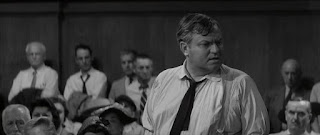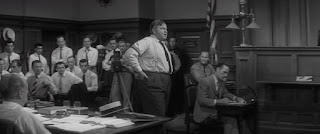The Story: Compulsion was not the first movie inspired by the infamous "Leopold and Loeb" murder. That would've been Rope, directed by Alfred Hitchcock (the one with the conceit of being filmed "in one continuous camera move"). But, it's the first one to attempt to portray the events of the crime and its trial, given the relaxed restrictions on what films could portray. The names are changed...because it was based on a fictionalized book and stage play by Meyer Levin.
That includes the name of Clarence Darrow. Darrow's name has gone down in history because of his participation as defense attorney in both this case and The Scopes "Monkey Trial". Both of those have permeated popular culture from fictionalizations that have made it to the movies.
Darrow took the case, not to prove the innocence of Leopold and Loeb—the two had confessed to the crime—but, as a life-long opponent of the death penalty, and was determined that the punishment for the two under-21-yer-olds be life imprisonment, rather than hanging. To that end, he had the two defendants plead guilty to the charges, eliminating a trial by jury, and leaving the sentencing to the judge presiding.
Darrow's plea to the judge took 12 hours for him to deliver (you can read it here)
and Meyer boiled it down to a pithy 10 minutes, but it's an amazing summation in its indictment of the court system, the actions of the State's Attorney, and even the crowd, and comparing the prosecution's own case to the very arguments they hammered home against Leopold and Loeb, that their actions were "premeditated" and for months had been "planned and schemed." Darrow took the emotion out of the case and then threw it back in with his closing words "I am pleading for the future; I am pleading for a
time
when hatred and cruelty will not control the hearts of men. When we can
learn by reason and judgment and understanding and faith that all life
is worth saving, and that mercy is the highest attribute of man."
Powerful stuff. And the film has the great fortune of having Orson Welles play it out in one of his best film performances.
The Set-Up: Judd Steiner (Dean Stockwell) and Artie Strauss (Bradford Dillman) have pleaded guilty to the killing of a youngster in Chicago's "Trial of the Century". Their attorney, Jonathan Wilk (Orson Welles) makes his closing argument in the sentencing phase.
Action.
JONATHAN WILK: This crime is the most fiendish, cold-blooded, inexcusable case the world has ever known. That's what Mr. Horn has told this court.
WILK: Your Honor, I've been practicing law a good deal longer than I ought to have, defending now for 45, 46 years, during all that time, I've never tried a case where the State's Attorney did not say that it was the most cold-blooded inexcusable case ever. Certainly there was no excuse for the killing of little Pauly Kessler. Certainly there was also no reason for it. (crowd murmurs)
WILK: If your Honor should doom these boys to die, it'll be because their parents are rich.(crowd)I don't need to mention that I'd fight as hard for the poor as for the rich.
If I'd come into this court...
WILK: there hadn't been all this weirdness and notoriety, this sensational publicity, and I said, "Your Honor I want to gather a plea of guilty and let you sentence them to life imprisonment," do you suppose the State's Attorneys would raise their voices in protest?
WILK: they say you can only get justice by shedding their last drop of blood. Isn't a lifetime behind prison bars enough for this mad act?
WILK: If you hang these boys, it will mean that in this land of ours, a court of law could not help but bow down to public opinion.
WILK: In as cruel a speech as he knew how to make, the State's Attorneys told this Court that we're pleading guilty...
WILK: Is there anyone of us who hasn't been guilty of some kind of delinquency in his youth? How many men are there here today, lawyers and congressmen, judges, and even States' Attorneys, who haven't been guilty of some kind of wild act in youth, and if the consequences didn't amount to much, and we didn't get caught, that was our good luck.
WILK: But this was something different. This was the mad act of two sick children who belong in a psychopathic hospital.
WILK: Is there any man with a decent regard for human life, and the slightest bit of heart, that doesn't understand it?
WILK: Yes, but here are officers of the State, who for months have planned and schemed and contrived to take these boys' lives.
WILK: Your Honor, I've become obsessed with this deep feeling of hate and anger. I've been fighting it, battling with it until it has fairly driven me mad.
WILK: Through the centuries, our laws have been modified, until now men look back with horror at the hangings and the killings of the past. It's been proven, that if the penalties are less barbarous, the crimes are less frequent. Do I need to argue with your Honor that cruelty only breeds cruelty? That every religious leader who's held up as an example has taught us that if there's any way to kill evil, it's not by killing men, and if there's any way of destroying hatred, and all that goes with it, it's not through evil and hatred and cruelty. It's through charity, love, understanding.
WILK: Is there any doubt that these boys would be safe in the hands of the founder of the Christian religion?
I...
WILK: ...knows that I'm not saying it simply to talk. Artie and Judd enticed him into a car and when he struggled, they hit him over the head and killed him. They did that.
WILK: Neither they nor I would want them released. They must be isolated from society. I'm asking this court to shut them into a prison for life.
WILK: Any cry for more goes back to the hyena, goes back to the beasts of the jungle. It's no part of man.
WILK: This court is told to give them the same mercy that they gave their victim. Your Honor, if our state is not kinder, more human, more considerate, more intelligent than the mad act of these two sick boys, then I'm sorry that I've lived so long.
WILK: I know that any mother might be the mother of little Pauly Kessler, who left home and went to school and never came back.
WILK: I guess the truth is that all parents can be criticized. And these might have done better, if they hadn't had so much...money. I do not know.
WILK: The State's Attorney has pictured the putting of the poor little dead body in the ditch. But your Honor, I can only think now of taking these two boys,
WILK: Can your Honor tell me what I deserve? Can your Honor appraise your self and say what you deserve?
WILK: The world has been one long slaughterhouse from the beginning until today, and the killing goes on and on and on. Why not read something, why not think, instead of blindly shouting for death.
WILK: Kill them because everybody's talking about the case? Because their parents have money? Kill them?
WILK: It's taken the world a long, long time to get to even where it is today. Your Honor, if you hang these boys, you turn back to the past.
WILK: I'm pleading for the future. Not merely for these boys, but for all boys, for all the young. I'm pleading, not for these two lives, but for life itself,
WILK: ...for a time when we can learn to overcome hatred with love, when we can learn that all life is worth saving, and that mercy is the highest attribute of men.
Words by Richard Murphy, Meyer Levin, and to a certain extent, Clarence Darrow
Pictures by William C. Mellor and Richard Fleischer
Compulsion is available on DVD and Blu-Ray from Fox Home Video.



























































































No comments:
Post a Comment